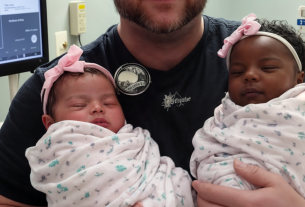The day Svetlana had imagined in her dreams for many years finally arrived. But instead of the expected relief, she felt her hands trembling with nerves.
Fifty-eight isn’t an age for a new life—right? That thought haunted her all morning.
She scrutinized herself in the hallway mirror. A strict suit, minimal makeup, hair pulled into a bun.
“Mom, are you ready? The taxi’s downstairs,” Maria peeked into the room, fastening her bag on the go.
“Almost. Do you think this suit is okay? Maybe I should wear something simpler?”
Maria sighed.
“Mom, you’re going to the notary, not to an execution. You look great. Stop worrying!”
“Easy for you to say. Your father is sure he’ll walk out today with our apartment and half of everything we’ve earned,” Svetlana nervously straightened her collar. “Remember what he said at the family dinner a month ago? ‘I spent thirty years with you; I have a right to compensation.’”
Maria rolled her eyes.
“Dad has always thought money was the main thing in life. That’s why you’re divorcing, isn’t it?”
Svetlana fell silent. How could she explain to her daughter that thirty years with a man who married you for your parents’ apartment in the center drains your soul? How to describe all those years when every kopeck saved for a vacation went to his “promising investments”?
The notary’s office greeted them with the coolness of air conditioners and subdued voices. Alexander was already there—impeccable suit, fresh haircut, the self-satisfied smile of someone who’d come to collect what he was owed.
“Ah, here’s my almost ex-family!” he spread his arms theatrically. “Sveta, you look wonderful. Divorce definitely agrees with you.”
“Let’s skip the show, Sasha,” Svetlana tried to speak evenly. “The notary is waiting.”
“As you say, dear. As you say.”
The notary’s office was exactly as Svetlana had imagined—strict, with heavy curtains and the smell of paper. A middle-aged woman with an attentive gaze offered them seats.
“So, ladies and gentlemen, all documents have been prepared according to your preliminary agreement. Let’s proceed.”
Alexander smugly leaned back in his chair. Under the table, Maria quietly squeezed her mother’s hand. Svetlana took a deep breath. It would all be over now.
And at that moment, the notary’s phone rang.
“My apologies,” she said, glancing at the screen. “This is from your law firm, Mr. Sokolov. I’ll answer.”
The conversation took less than a minute, but the notary’s face noticeably changed.
“I’ve just received new information, and it significantly changes the situation,” she said. “The apartment on Leninsky, 47 will not be included in the division of property because, according to a deed of gift, it has already belonged to Svetlana and her children for a year. All the documents are in order; everything has been officially executed.”
Alexander’s face changed before their eyes—the smug smile slowly turned into a bewildered grimace.
“What deed of gift?” he sprang in his seat. “What nonsense is this? That’s our main apartment!”
Maintaining her composure, the notary took out a copy of the document.
“Donor—Igor Petrovich Korshunov, father of Svetlana Igorevna. Registration date—April 15 of last year.”
“Grandpa,” Maria breathed, eyes wide, “so that’s why he asked us to come to him then and not say anything!”
Svetlana sat motionless. A year ago her father had summoned her and said he’d made a decision. “I see everything, Svetochka. That scoundrel never valued you. And the apartment is mine; I earned it—it’s up to me who gets it.” She’d tried to talk the old man out of it—she didn’t want scandals, she feared her husband’s reaction. But her father insisted. “To the children and grandchildren, not to riffraff.”
“This is forgery!” Alexander jumped up, looming over the table. “You put your senile father up to this! Sveta, do you realize this is fraud?”
“Please sit down,” the notary said firmly. “The documents are in order. If you don’t believe it, you can go to court, but for now this paper is in effect and there’s nothing to be done.”
“So what’s left to divide?” Alexander’s voice trembled with anger. “The dacha plot with a shack on it? The ten-year-old car?”
The notary methodically listed the remaining joint property. With each item, Alexander’s face grew darker.
“You arranged this on purpose,” he turned to Svetlana. “I carried this family for thirty years! I worked like a dog!”
“You carried it?” Suddenly Svetlana felt something snap inside, like a taut string breaking. “And who paid off the loans after your ‘brilliant’ business ideas? Who stayed with the child while you disappeared with your ‘partners’?”
“Mama…” Maria tried to calm her mother, but it was too late.
“No, Masha, enough!” Svetlana stood, looking her husband straight in the eye. “For thirty years I listened that I didn’t earn enough, wasn’t pretty enough, wasn’t smart enough. For thirty years I was afraid of losing the house and leaving you without the children. But you know what? That house was never yours. My father saw right through you from the start.”
“Masha, say something!” Alexander appealed to his daughter. “You can’t approve of this robbery! It’s your inheritance too!”
Maria looked at her father with sadness and pity.
“Dad, Grandpa did the right thing. I know about your ‘assistant’ Veronika. And about the money you withdrew from Mom’s card. We all knew.”
Alexander fell silent, as if the air had been cut off. His gaze darted between his wife, his daughter, and the notary, seeking support and finding none.
“If all the formalities are in order,” Svetlana said quietly, turning to the notary, “let’s continue the procedure.”
The notary nodded and slid the documents toward them.
Alexander sank into his chair, hunched, as if he’d aged ten years in the last five minutes.
“You can’t do this to me,” he almost whispered. “I’m your husband. I’m your father.”
“Were,” Svetlana replied curtly, and took the pen.
The rest of the procedure passed in oppressive silence. Alexander signed the papers mechanically, as if losing a piece of his self-confidence with each page. Svetlana, on the contrary, felt a strange lightness, as if each signature lifted an invisible weight from her shoulders.
When everything was finished, the notary gathered the papers.
“Congratulations, the divorce procedure is complete. You will receive the certificate of dissolution within ten business days.”
Alexander stood up sharply, nearly knocking over his chair.
“This isn’t the end,” he hissed through his teeth. “I will challenge the deed of gift. Your father wasn’t in his right mind when he signed it!”
“Dad!” Maria protested. “Grandpa is absolutely healthy and in sound mind! He beats his friends at chess every week.”
“Don’t defend her!” Alexander raised his voice, addressing his daughter. “Your mother has always been cunning. The quiet bookkeeper with a calculator! But in reality she calculated everything!”
Svetlana slowly gathered her bag, feeling something new rising within her. Not anger, not resentment—something like liberation.
“Sasha,” for the first time in many years she looked him straight in the eyes without fear, “do you know what’s saddest? I really did love you. For a long time, painfully, despite everything. And if you had asked me even once about my feelings rather than the bank balance, maybe we wouldn’t be sitting here now.”
“Spare me the melodrama,” he snorted, but something flickered in his gaze.
“Already spared you,” she turned toward the door.
When they left the building, Alexander headed quickly to his car.
“Do you want to stop by a café?” Maria asked, looking at her mother with concern. “You look tired.”
“No. You know what I want? To go home. To our apartment.”
In the car on the way home, Maria finally dared to ask:
“Mom, why did you never tell me about the deed of gift?”
Svetlana looked out the window at the city sliding by.
“I didn’t know myself it had already been executed. Grandpa said he would take care of everything, but I thought it was just talk. He wanted to shield me… from what happened today.”
“But you could have told me…”
“What would have changed?” Svetlana turned to her daughter. “You would have carried that secret, hiding it from your father. I didn’t want to put you in that position.”
The car stopped at their familiar building.
They climbed to the third floor, and Svetlana unlocked the door of the apartment where she’d lived most of her life. Maria had grown up here; her best and worst days had passed here. But now the apartment felt different—without Alexander’s things, without his loud voice and his habit of controlling everything.
“Strange, isn’t it?” Maria looked around the spacious living room. “As if the apartment sighed with relief.”
Svetlana unexpectedly laughed.
“You sound just like my father! He always insisted that houses have souls.”
They went into the kitchen, and Svetlana turned the kettle on by force of habit.
“You know, I really did think he married me because of this apartment,” she said thoughtfully, taking out cups. “We met when Dad had just received the occupancy order. A three-room place in the center—that was something incredible back then.”
“And how was it really?”
“I don’t know, Masha. Maybe I was wrong. Maybe at the beginning he really did love me, and then… people change.”
The kettle clicked, and in the ensuing silence Maria’s phone rang.
“It’s Dad,” she said, looking at the screen uncertainly.
Svetlana nodded.
“Answer. He’s still your father.”
Maria stepped into the hallway, and Svetlana heard snatches of her conversation—first tense one-word replies, then something more emotional. She didn’t listen on purpose—she just poured tea and thought about the strange feeling of emptiness filling her. Not a painful emptiness, but as if space had opened up for something new.
“He wants to pick up his things,” Maria returned to the kitchen looking bewildered. “He says he’ll come tomorrow morning. And he asked me to say he’s sorry for the scene at the notary’s.”
“He’s apologizing?” Svetlana raised her eyebrows in surprise. “That’s new.”
“He… seems upset. Really,” Maria sat down at the table. “He said he didn’t expect things to turn out like this.”
“And how did he expect?” Svetlana set a cup in front of her daughter. “That I’d cry and beg him to stay? Or that you and I would end up on the street?”
“Mom,” Maria gently touched her hand, “you didn’t expect the apartment to have already been transferred either. Admit it, it was risky to start the divorce without knowing for sure.”
Svetlana pondered. Indeed, the decision to file for divorce had not come easily. After that last scandal, when she discovered yet another mistress and money missing from the joint account, something inside her finally broke. She was no longer afraid of losing property—she was ready to start from scratch, if only to break free from the long-drawn-out lies.
“You know, Masha, I was ready to lose the apartment,” she said quietly. “I just couldn’t go on like this. Waking up every morning and thinking: will he be kind today or start a fight? How much money will disappear this month? What lie will I hear today?”
Maria squeezed her mother’s hand tightly.
“I never understood why you put up with it for so long. Even as a child I saw how he treated you.”
“For your sake,” Svetlana shrugged. “It seemed the right thing to do. And then… then it becomes scary to change anything. It feels like it’s already too late.”
“And now, aren’t you scared?”
Svetlana looked around the kitchen where so many family dramas had unfolded, where she’d swallowed tears while cooking dinner, where she’d listened to reproaches and tried to please.
“I’m scared,” she admitted honestly. “But in a different way. As if I’m standing at the edge of something vast and unknown. But for the first time in many years, it’s my choice, you understand?”
The doorbell rang, making them both start.
“Dad?” Maria was surprised. “But he said tomorrow!”
Svetlana stood up, feeling everything inside tighten with tension. She wasn’t ready to see Alexander again today. She needed time to grasp her new reality.
But it wasn’t Alexander at the door. An elderly man with a cane and mischievous eyes smiled at her.
“Well, daughter, will you receive guests?”
“Dad!” Svetlana rushed to hug her father. “What are you doing here?”
“Grandpa!” Maria exclaimed, running to the hallway.
Igor Petrovich hugged them both, then stepped back, looking closely at his daughter.
“Well, how did it go? Your ex called me, shouted something into the phone about meanness and deceit. I take it the deed of gift worked?”
Svetlana laughed through suddenly welling tears.
“It worked. But you could have warned me!”
“And give you a chance to refuse out of nobility?” the old man squinted slyly. “No way. I watched that sponger use you for too long. Enough!”
They went into the kitchen, and Svetlana took out another cup.
“I thought I’d start a new life completely alone,” she said softly, pouring the tea. “But it turns out I have you. And I have a home.”
“You’ve always had a family,” Igor Petrovich put a wrinkled hand on her shoulder. “You just got too caught up in the role of the martyr-wife. Now you’ll be just Svetlana. How do you like that prospect?”
Svetlana thought back to her younger self—with dreams, ambitions, plans. Where had it all gone over the years of marriage? Dissolved into routine, fears, and the fatigue of constant conflict.
“I don’t even know who this ‘just Svetlana’ is,” she admitted. “I’ll have to get to know her again.”
“I’m sure she’s great,” Maria smiled. “And now she has tons of time for herself.”
It was starting to get dark outside. The first day of a new life was coming to an end. There would still be difficulties ahead—talks with Alexander, maybe even court cases. But something told Svetlana that the hardest part was already behind her. She had taken a step into the unknown and hadn’t fallen. Which meant she could take the next one.
“To a new life,” Igor Petrovich raised his cup of tea.
“To a new life,” Svetlana and Maria echoed.
And for the first time in many years, Svetlana felt like not a wife, not a mother, not a victim of circumstance—but simply herself. Free. Imperfect. Real.



